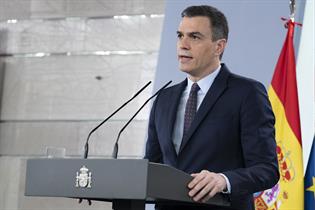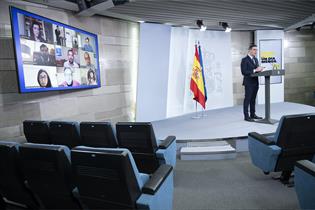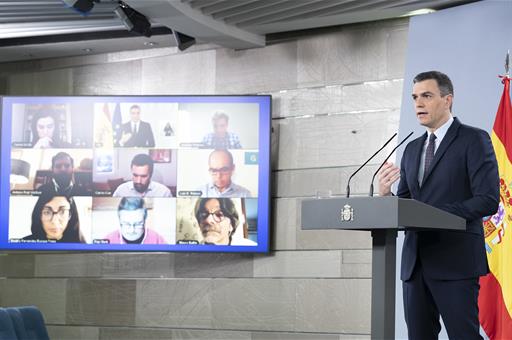Coronavirus COVID-19
Government to ask Lower House to extend state of emergency to 9 May
President's News - 2020.4.18
Moncloa Palace, Madrid
At a press briefing that he began by recalling the close to 20,000 people who have died from the coronavirus in Spain, the President of the Government highlighted the capacity of the health system to hold out. "Thanks to the commitment and professionalism of our health workers, 74,662 patients, that is close to 42% of those diagnosed, have now overcome the disease and been discharged from hospital, one of the highest rates in those countries hardest hit by the pandemic". Pedro Sánchez also underlined the exemplary response by the public, whose responsibility has means that thousands of lives have been saved and the spread of the virus has been contained.
"We have put the worst moments behind us and contained the brutal ravages of the epidemic", said the President of the Government, adding that these achievements are still fragile and it is essential to consolidate them before lifting the general lockdown and starting the transition towards the "new normality".
To reach that goal, he explained, the government is making progress on complying with the six guidelines set by the World Health Organization: control of the transmission; detection of cases through testing; monitoring of locations at greatest risk, such as hospitals and care homes for the elderly; establishment of a system to avoid imported transmissions; prevention at work and education centres, and complete information for the public about hygiene and social distancing rules.
Limited trips out for children
 Pool Moncloa / Borja Puig de la BellacasaPedro Sánchez argued that despite the "tremendous progress" made, Spain is still on the path to complying with these guidelines, and hence it is still not possible to move into the de-escalation phase. For that reason, the government will propose to the regional presidents to take a new extension to the state of emergency before the Lower House of Parliament until the end of 9 May.
Pool Moncloa / Borja Puig de la BellacasaPedro Sánchez argued that despite the "tremendous progress" made, Spain is still on the path to complying with these guidelines, and hence it is still not possible to move into the de-escalation phase. For that reason, the government will propose to the regional presidents to take a new extension to the state of emergency before the Lower House of Parliament until the end of 9 May.
This extension of the state of emergency, stressed the President of the Government, will not be the same as the previous extensions, since the progress made in the last five weeks makes it possible to adopt decisions with the outlook of a de-escalation in the month of May, a horizon on which the government is working with epidemiologists and experts in other areas.
Specifically, after consulting with specialist and scientists, the government is in favour of lifting the lockdown for children as from 27 April, such that they will be allowed out onto the streets on a limited basis but must comply with a series of conditions to avoid new transmissions, a decision that he will address in the weekly video-conference with the regional presidents. When asked about the age limit of these trips out, the President of the Government specified that the measure is still being firmed up, but the point of reference is the Public Health Act, which sets the age at 12.
Agreement for social and economic reconstruction
In his speech at Moncloa Palace, the President of the Government reiterated his proposal to forge an agreement with the political forces on the main strands of the socio-economic reconstruction of the country for the coming years, an agreement which should be also be forged through a collaboration agreement with all the regional and local institutions and with the social stakeholders. Pedro Sánchez expressed his satisfaction as the "receptive response" from most parties in the first round of contacts.
 Pool Moncloa / Borja Puig de la BellacasaIn order to facilitate understanding, argued Pedro Sánchez, the agreements should focus on four issues tied to the current emergency: strengthening the health system; the reconstruction of the business fabric and job creation, with a special focus on SMEs, the self-employed, the social economy and the sectors hardest hit; social protection so that no-one is abandoned and the most vulnerable families are protected, and a common position before the European Union.
Pool Moncloa / Borja Puig de la BellacasaIn order to facilitate understanding, argued Pedro Sánchez, the agreements should focus on four issues tied to the current emergency: strengthening the health system; the reconstruction of the business fabric and job creation, with a special focus on SMEs, the self-employed, the social economy and the sectors hardest hit; social protection so that no-one is abandoned and the most vulnerable families are protected, and a common position before the European Union.
The President of the Government stated that "there can be no future without solidarity", and indicated that the meetings with EU leaders are starting to bear fruit. He also pointed out that he hopes to make further progress at the upcoming meeting of the European Council, to be held on 27 April. "We are all part of Europe and now is the time for that to be made evident", he claimed.
Non official translation





